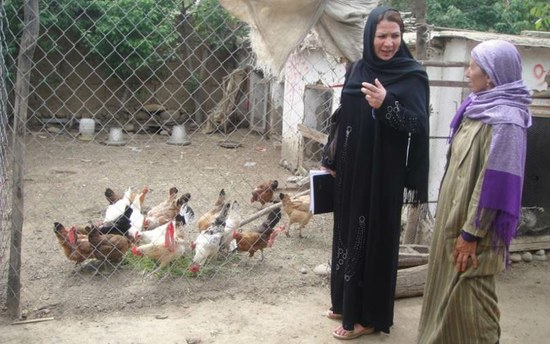 Contribution to MMI Annual Report 2013
Contribution to MMI Annual Report 2013
For several years HealthNet has been working in addressing the needs of women and vulnerable people in Afghan communities and provinces. After a 3 year programme, this year we see it is time to “harvest” results.
Together with the Afghan Women’s Resource Center (AWRC) and the Afghan Women Educational Center (AWEC), HealthNet has set out a programme to reinforce the ability of women to undertake culturally appropriate action towards the improvement of their living conditions. In close collaboration with local authorities and local religious and educational leaders, community groups and organisations have been actively mobilising women at a community level to take control and determine the direction of their lives; exploring local definitions of family violence and harmful practices and identifying cultural appropriate solutions; building the capacity of local organisations and relevant authorities, enabling them to address violent practices and to protects its victims; reinforcing the collaboration with the Ministry of women’s affairs (MoWA ) according to the recommendations and priorities as described in the national action plan for women’s affairs (NAPWA).
According to a recent baseline report (Afghan Women’s Network, Cordaid, 2013), the security of Afghan women has again deteriorated in the past years, particularly in rural areas where armed opposition groups have gained ground. Women’s freedom of movement has been severely curtailed, as has their access to employment, education and health care. Women face problems on the street when they go to work, a health clinic, or take their children to school. Our experience has taught us that promoting and supporting women to generate income and to improve their educational level, is an important way towards women empowerment.
Why is this a priority for HealthNet?
We work on the social determinants of health in order to improve access to health care for women and simultaneously works in the same provinces on improvement of service delivery in health care and training of community midwifes. It is the combination of programmes that have an impact in the mentioned provinces.
| The programme |
|---|
| Where? Kapisam Lagman, Ghor, Kunar, Kunduz, Nangarhar, Logar, Daikundi and Uruzgan provincies, Afghanistan
Why? Because in Afghanistan women and girls are still repressed and at serious risk: about 87% of the Afghan women regularly experience sexual and/or physical violence in their lives. Also still an estimated 60% of the girls is forced to marry before the legal age of 16. Young girls often end up in the hospital with severe physical injuries and psychological trauma. Donors: European Commission |
Participating women experience positive change
Between 2011 and 2013, the project resulted in self-organized provision of tailor made services for 3432 vulnerable women and children. Through the establishment of supportive networks at different levels of society, some 150 female focal points were able to start up 180 micro-projects. These include tailoring, carpet weaving, cow keeping, farming, and providing English and holy Quran courses. They act as mobilizers for their surroundings by encouraging others to start up similar activities. In each target province campaigns were organized to create a supportive environment about Women’s Rights. An evaluation of the project revealed that more than 90% of the participating women experienced social, psychological and economic growth from the micro-projects they were involved in.
How to sustain the achieved results?
Given the magnitude of the problem and the means available, services must be provided on a substantial level and organized in a way that they become financial and socially sustainable. Our local staff therefore supported the women in establishing four female Community Based Organizations (CBOs), enabling them to continue their activities after the program ended in December 2013. The results look promising but more time is needed to develop guidelines, by-laws and reinforce organizational capacity. Once officially registered these CBOs will have more power and mandate to undertake effective action in line with national policies towards the promotion and actual implementation of women’s rights in Afghanistan.
Continuation and extension
In 2013 HealthNet together with the Ministry of Women Affairs organized a National Conference where participants shared results, best practices and challenges in the presence of the minister of Women Affairs. We are proud that the minister expressed her satisfaction about the years of collaboration between the MoWA and HealthNet. She requested to continue our efforts and extent both the duration and coverage area of women projects. Also the European Commission, the funding partner, emphasized that they “are in for the long haul”. HealthNet has just established an independent Afghan NGO that will help us to move forward through different funding channels and will create more opportunities to support the CBOs and start new initiatives.
An illlustration of the increased autonomy within the traditional setting of family and community life: In the Afghan village of Borjhay lives Karima with her husband and seven children. Being a farmer, her husband does not earn enough money to sustain the family livelihood. Karima was given the opportunity to take part in a five-day training in which women learn about the various opportunities to improve their situation. Then Karina began a chicken farm. That was difficult in the first instance as the village elder was not in favor of the idea, and nobody wanted to invest and participate in the plan. Together with our local officers she eventually succeeded to convince her community that a small investment can make huge difference. Eighteen months later 27 women from the village earn a private income which has improved both their economic and social situation.
Contribution to the Annual Report 2013 of the MMI Network
More information: www.healthnettpo.org
